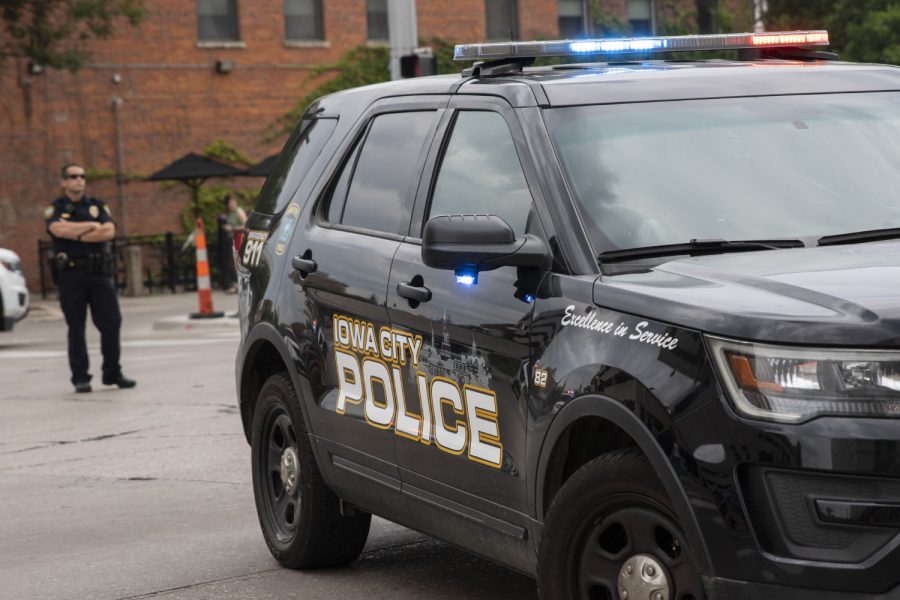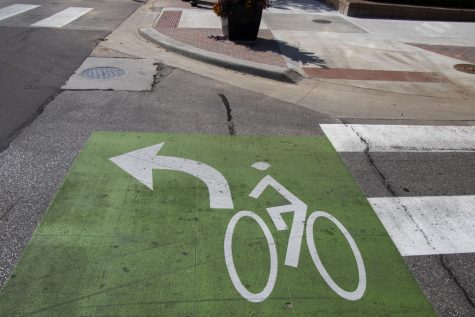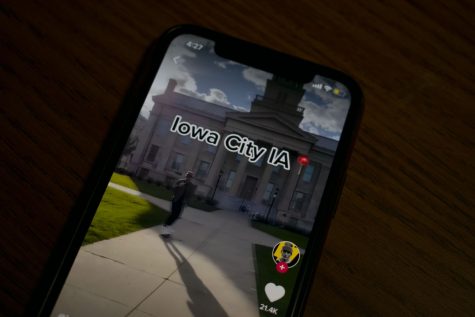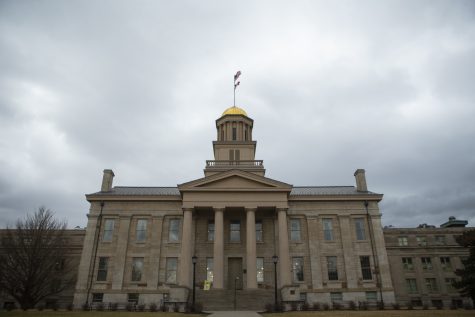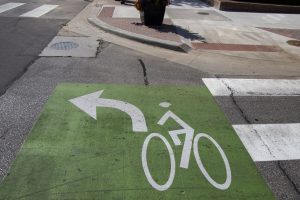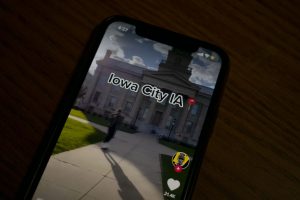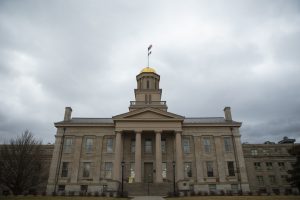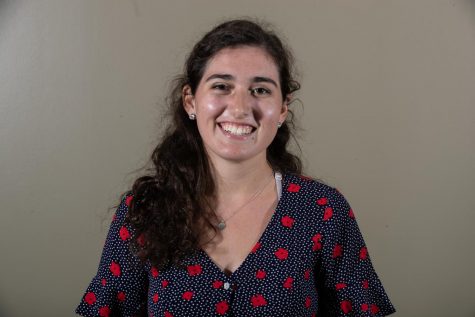University of Iowa Reimagining Campus Safety Action Committee to hold town hall meetings
Earlier this month the UI released data from 2017 to 2019, the UIPD has seen a gradual decline in situations where officers implemented use of force, coinciding with the recently created Reimagining Campus Safety Action Committee.
Iowa City Police Department vehicles are seen on July 9, 2019.
November 12, 2020
A 26-member committee tasked with “reimagining” campus safety will hold a series of public townhall meetings in February 2021.
The UI created the Reimagining Campus Safety Action Committee, which serves to identify strategies, tactics, and timelines for bettering the campus community and ensuring the safety of all individuals. It will focus on those who have experienced disproportionate mistreatment from systems, one being law enforcement.
Earlier this month, the University of Iowa Department of Public Safety released data between 2017 and 2019 regarding the use of force, showing a decline in situations where officers used forceful tactics against students and community members.
The University of Iowa Department of Public Safety’s policy manual defines force as “the application of physical techniques or tactics, chemical agents, or weapons to another person. It is not a use of force when a person allows him/herself to be searched, escorted, handcuffed, or restrained.”
The data’s release comes after the UI announced their commitment to positive change within the campus community and adjustments they would make to the UI Police Department in June.
The reported data shows that out of the 53 incidents where officers deemed use of force to be necessary, 0 percent of those situations resulted in death or serious injuries, 8 percent resulted in minor injuries, and 92 percent resulted in no injuries. Within these incidents, 14 percent of those detained were students and 86 percent were nonstudents.
UIPD also included data regarding race of suspect in situations where force was used. The races listed in the data included Indian, Asian or Pacific Islander, Black, White, and Unknown. Six percent of suspects’ race was unknown, 38 percent were Black, and 56 percent were white.
As listed in the reported data, there were 23 use of force incidents in 2017, 18 in 2018, and 12 in 2019. UI Student Government President Connor Wooff said these numbers further motivate USG to work with the UI to ensure that the UIPD and the Department of Public Safety is held accountable for its actions.
“Statistics like that are really shocking, disappointing, and unacceptable,” Wooff said. “It’s important for us to put them on the table and add that to the things that we really want to change about the police department on campus.”
UI Vice President of Student Life Sarah Hansen, who is the Chair of the Reimagining Campus Safety Action Committee wrote in an email to The Daily Iowan that the committee has been continuously evolving throughout the semester, independent of the recently reported public-safety data.
Hansen wrote that the committee plans to host open town hall sessions during the spring semester to receive feedback from the campus community.
“Our goals for the remainder of the academic year are to complete our community engagement activities and provide recommendations to President Harreld in the spring semester,” Hansen said.
Wooff said USG became involved in suggesting improvements to the UI Department of Public Safety over the summer, following the murder of George Floyd and an incident where peacful protesters in Iowa City were tear gassed by officers from the Iowa City Police Department.
“The Reimagining Public Safety Committee really started from the call student government made the summer after students were tear gassed by Iowa City Police Department for peaceful protesting,” Wooff said. “We made a call to administration for a number of different asks, one of them included re-evaluating and auditing our Campus Public Safety Department, including the restyled police department.”
UIPD Captain Mark Bullock said this data shows a steady decline in incidents that were reported where use of force by UIPD officers was needed, something that he said can be accredited to the department’s push in recent years toward increasing various training programs for their staff.
The fair and impartial policing training program is one program included, something that Bullock said has been extremely beneficial for staff.
“It’s an implicit bias training that trains officers to be aware of those biases that they have that they may not recognize, and see how those biases affect their decisions,” Bullock said. “It really helps officers come to a situation, knowing where they stand, it gives them the opportunity to better react to it to react in a factual understanding, rather than a biased way.”
RELATED: Police to increase cultural competency training, dialogue with community
Bullock said an additional program that the department has largely focused on is the crisis intervention training program, a mental-health awareness and verbal de-escalation training wrapped into one. It was introduced to Johnson County in 2017, and it has largely helped reduce use of force incidents, he said.
“It gives officers a framework to understand when people are in acute mental crisis, and then the framework or the game plan, to find the appropriate de-escalation techniques to bring them out of that crisis,” he said, “…or even not to bring them out of the crisis, but to get them to a point where they can get them to resources without having to take custody by physical force.”
Bullock said he thinks the recent data and the increase in training programs for the department show the type of progress UIPD is committed to.
“I think it’s a good indicator that we’re on the right path,” Bullock said. “Our department has been very intentional in being progressive in being transparent. We’ve made a very conscious effort since the conception of the department to try to be on the leading edge of technology, and in policy, and really just progressive culture.”
Wooff said USG has had several conversations with UIPD since this summer, where they have asked the department to re-evaluate their priorities, one being transparency.
Wooff said USG and the Reimagining Campus Safety Action committee have asked the department to also openly share their reports and the data associated with those reports, something unique to the UI community.
“I’m excited about the process,” Wooff said. “When I meet with my Big 10 colleagues, it’s something that I share as a really positive step for our campus that a lot of schools are having issues with.”
Moving forward, Bullock said the department would like to continue to engage with the community and receive feedback as to how they can further improve safety on the UI campus and in the Iowa City area.
“I hope that people can feel that they can come to us if they have any questions or give us advice or give us guidance,” Bullock said. “Obviously, we’re a service-oriented organization, as a profession, we’re service oriented, but as a department, we try to take that to the next level. And a huge portion of that is getting community feedback and inviting our community into the department to help make this campus as safe and inclusive as we can.”



